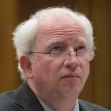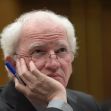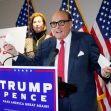The State Bar of California has filed 11 disciplinary charges against John Charles Eastman, one of the chief legal advisors to ex-President Donald J. Trump regarding the outcome of the 2020 U.S. presidential election. The allegations assert that Eastman “engaged in a course of conduct to plan, promote, and assist” Trump in “engaging in a strategy to overturn the legitimate results of the 2020 election by obstructing the electoral counts in several states.” According to its news release, the Bar “intends to seek Eastman’s disbarment before the State Bar Court.
The State Bar’s Chief Trial Counsel George Cardona made the announcement on January 26, after the Bar completed its investigation of Eastman’s many “false and misleading statements” about election fraud that began in March 2020. Cardona highlighted Eastman’s memos and his January 6 speech at Trump’s ”Save America” Washington D.C. rally, which, in part, led to the insurrection by an angry crowd that refused to accept the results of President Biden’s presidential victory. Marching to the Capitol and shouting “Hang Mike Pence,” the angry crowd tried to force the Vice President to overturn the legitimate electoral count by the states.
According to CNN, in a radio show hosted by former Trump advisor Steve Bannon, Eastman admitted that he had met with Pence, where he told him that it was an “open question” whether he had the authority to disregard the electoral counts from seven states. He said it would depend on whether Pence “had the spine and the courage” to take that action.
Two days after the Bannon meeting, according to the Washington Post, Eastman authored his first memos that detailed how Pence could overturn the election. According to the Post’s copy of a “PRIVILEGED AND CONFIDENTIAL” (capitals in original) 2021 memo, Eastman told Pence that if he “disregarded” the Electoral College votes of seven specific states, neither Biden nor any other candidate would reach the 270 Electoral College votes needed to secure a win. When this happened, each state delegation would be allowed to cast a single vote for president. Since Republicans controlled the votes of 26 states, the majority would be able to elect Trump.
Eastman’s memos detail six steps that Pence could take according to the 12th amendment, which provides a means for presidential elections to be decided by a joint session of both houses of Congress. He said this constitutional procedure makes the Electoral Count Act unconstitutional because it says that both the House and the Senate, “acting separately,” can decide the question of who is elected.
The first step, according to the Eastman memo that the Post said was sent to Senator Mike Lee (R-Utah), was for Pence, presiding over the joint session, to conduct a roll call vote of each state. Second, when Pence called for Arizona’s electoral vote, he was to announce that he had received vote counts from “multiple electors,” so he would have to defer his decision on that state’s electoral votes. Third, at the conclusion of the alphabetical roll call, Pence was to announce “ongoing disputes” from seven states, giving Trump 228 votes, while Biden had only 222 of the 232 needed for election. Pence was then to announce that Trump was reelected.
But the details continued. Fifth, because of the disputed results, Eastman suggested that someone like Ted Cruz (R-TX) or Rand Paul (R-KY), should demand that “normal rules” be followed, thus creating a stalemate and giving the states more time to formally support an alternate electoral slate. Sixth, and finally, he instructs that “Pence should do this without asking permission, thus provoking a lawsuit that would result in a Trump victory because the courts will rule that the Constitution gives the Vice President the power to be the “ultimate arbiter.”
Pence did not accept this scenario. Eastman later claimed that the memo did not reflect his personal views, that the Pence rejection scenario was “not viable,” and that the memo was “just a draft.” Yet Eastman’s rally speech on January 6 further advanced the memos’ scenarios. In it, he claimed that some voting machines contained “secret folders” that could change voting results and that “dead people had voted.” He also argued that Pence “did not deserve to be in office if he did not delay” the electoral vote count.
Eastman, 62, is a former law clerk to U.S. Supreme Court Justice Clarence Thomas. He is also a former dean of the Chapman University School of Law and was the founding director of the Center for Constitutional Jurisprudence, a conservative think-tank associated with California’s Claremont Institute. Its website says the Center’s mission is “to restore the constitutional protections created by the Founding Fathers.” The State Bar apparently did not believe that one of those constitutional protections was promoting election fraud.
The State Bar’s Notice of Disciplinary Charges states that Eastman’s strategies, as well as other interactions with Trump, Pence and their associates, were “unsupported by law, based on false and misleading assertions of fact, and designed for the purpose of keeping Trump in office.” Cardona said that Eastman “knew or should have known” that “massive fraud was at play.” But Eastman “ignored these truths,” and “incited the (January 6) crowd to take action.”
Cardona explained that California’s State Bar Court is the country’s only independent court “dedicated solely to attorney discipline.” The Court will determine whether Cardona’s office “has proved charges of professional conduct by clear and convincing evidence.” If it meets this test, the State Bar will transmit its recommendation of disbarment to the California Supreme Court. Disbarment will strike Eastman’s name from the Bar and make him ineligible to practice law in California.






